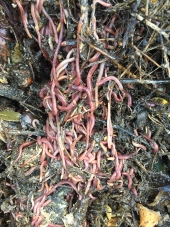Hi Annie.
That's a great idea with the selling of worm castings out of the farmers' market. If you wanted to experiment or diversify your product line a bit, you could probably also do a worm casting tea stabilised with molasses as a liquid probiotic to your worm casting prebiotic.
All the information you could possibly need is in the collection of threads by Bryant Redhawk, whose comprehension of soil biology likely outstrips everyone's. I have posted a link below.
https://permies.com/wiki/77424/List-Bryant-RedHawk-Epic-Soil
I think your current approach will work, but you will want to monitor humidity regularly, especially on smaller packages, if your intent is to keep the soil life alive, if dormant.
You might also want to consider selling worm castings with some few worms left in it. They will continue to condition the soil, and continue to impart enzymes from their digestive tract to their castings, which will help keep it all going.
Let us know how it all goes. Good luck, and keep us posted.
-CK
A human being should be able to change a diaper, plan an invasion, butcher a hog, conn a ship, design a building, write a sonnet, balance accounts, build a wall, set a bone, comfort the dying, take orders, give orders, cooperate, act alone, solve equations, analyze a new problem, pitch manure, program a computer, cook a tasty meal, fight efficiently, die gallantly. Specialization is for insects.
-Robert A. Heinlein






